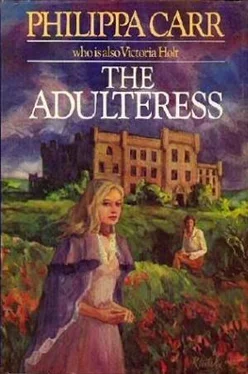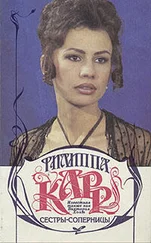There was an air of excitement about him—almost gaiety. It seemed as though he had cast away his cares. I found that I was doing the same.
In the world beyond this house I had my duties, my unsatisfactory life to lead, my fears, my sadness, my terrible pity when I sat beside my husband's bed ... but here in this small house, in those rooms over those in which he saw his patients, I could be happy.
He said: "Zipporah ... we can't go on holding back what must be."
I shook my head. "I must go home," I said.
But he took off my cape and held me against him.
He said: "Surely we can have this."
I said again: "I must go." But there was no conviction in my voice.
I allowed myself to be led upstairs. I allowed myself to be disrobed not only of my clothes but of my honor. I shared with my lover that burning desire; again I knew the feeling that everything else must be forgotten, shut away to satisfy this need.
I was a deeply passionate woman; Charles was a deeply passionate man. We loved each other. I tell myself that what happened was inevitable.
And for the second time I became an adulteress.
Afterward we lay side by side on his bed and my thoughts went back over the years so that I could almost hear the sounds of the fair.
Gerard had been lighthearted, reaching out for pleasure. Charles was different. He was so serious. He would never have come to this if he had not cared deeply for me. He was serious-minded. This was not a lighthearted moment of joy. Was that what it had been with Gerard? This was solemn, binding. Charles and I were, apart from according to law, man and wife.
I felt that and so did he, I know.
"One day," he said, "all will be well. Won't it, Zipporah?"
It was in a way a promise ... a bond. We did not want to mention Jean-Louis for only his death could make our marriage possible. But as we lay together we were as one and we knew that what had passed between us had bound us together for as long as we should live.
Now that we had become lovers our passionate need for each other had been sparked into a mighty conflagration. We no longer waited for opportunities: we made them. There were the days when the housekeeper visited her sister. But there were other occasions besides. We met sometimes in woods not too near the houses and we would lie together in secluded spots and talk endlessly and sometimes make love.
Charles had changed. There was a hopefulness about him which I felt must be noticeable. The gloom had lifted. He was like another man. I wondered if I had changed also.
Sometimes I noticed Isabel watching me covertly.
She said: "You're looking better, Zipporah. I'm so glad. You began to look quite seedy."
"I'm getting used to things," I answered. I hope there wasn't a lilt in my voice. I couldn't help it. I knew I was wrong, but I was so happy at times. At others I would sit by Jean-Louis's bed and then a terrible sense of guilt would weigh me down. Once he opened his eyes and I found him regarding me steadily.
"You're so good to me, Zipporah," he said. "You're so patient always. I'm afraid I get irritable. I'm always waiting for the pain. It's like a monster waiting to leap on me. Then I see you ... and I feel I'm so lucky to have you."
"Oh, don't ... don't," I cried. And I was near to breaking down. "What I do for you I want to do. I want to be with you ... to make you happy."
Then he closed his eyes, smiling, and I thought: Insincere woman, wicked Zipporah, adulteress!
Once when Charles and I were returning from the woods we met Evalina. She came upon us suddenly as we were brushing the leaves from our clothes. I trembled to think that she might have come a little sooner. She looked plump and contented.
She hailed us. "There'll be lots of blackberries later on," she said. "Look at these bushes."
We looked.
"Taking a stroll in the woods?" she said. "So was I. Beautiful this time of the year, aren't they?"
Was her gaze a little malicious? I told myself she had changed but she was still Evalina.
"And how is your husband?" she asked.
Was there a certain emphasis in her words?
I said he was as well as we could hope. If he had four days free from pain that was very good.
She nodded; then she smiled suddenly. "Nice for you to be able to get out a bit. We all need it. I'm expecting again. Well, not for some time ... but it's so."
"Congratulations," I said.
"Well, good day to you ... doctor ... Mistress Ran-some."
"What's wrong?" said Charles when she had gone.
"I think she was spying on us."
"No, she was just walking."
"I remember her when she was at Eversleigh with her mother."
"She's changed now. She's become the lady of the house. She is a good mother to her little boy and she and Brent seem made for each other."
"But she saw us together."
"Why shouldn't we walk in the woods?"
"I suppose I feel guilty."
"Dearest Zipporah, please don't. You've made me so happy-"
"I'm glad," I said. "I'm being foolish. I'm trying hard to forget what I've done. I want to be happy. Do you know, I think that the only way I can live through all this is by being happy for a time. It's like the laudanum ... it gives me respite and then I can go on and fight."
He gripped my hand. He understood.
Lottie had come back from Clavering in high spirits. She had had a wonderful holiday and chattered to Jean-Louis about Sabrina, Clarissa and Dickon. He liked to hear her and I was sure he was better for her presence.
I tried to prevent her—and so did he—seeing the pain. I felt she was too young to be disturbed, as she undoubtedly would have been.
It was a great joy to have her back. She was running about making sure that her dog and horse were all right. She must go over to see Hetty Fenton and the children. She had brought jars of my mother's jams and preserves for Hetty and little gifts for the children—a chocolate mouse and ball and skittles.
She played with them, and was always welcome, I knew, at Hetty's house.
Miss Carter seemed primmer than usual.
"Miss Carter is so good because she believes that if she's not she'll burn forever," Lottie told me.
"Poor Miss Carter," I said.
"Why poor Miss Carter? She'll go straight to heaven. It's the rest of us who she thinks are going to burn in hell."
"My dear Lottie," I said. "I am sure none of us is going to burn in hell."
"Not even the wicked ones? Miss Carter says that's God's words."
"I'm sure it's her way of interpreting it. If you repent you'll be forgiven. That's in the Bible, too."
"Sometimes I think Miss Carter would be disappointed if people didn't burn."
"Look here," I said, "you stop worrying about it. You be good and kind and thoughtful ... which you are most of the time ... and you'll be safe from the fires of hell."
She laughed with me, but I did wonder whether Miss Carter was too fanatical to have the care of a young girl.
I should have liked to talk to Jean-Louis about it but of course I could not worry him with such matters. I had to confess that when I was with Charles there were so many other matters with which to occupy ourselves. I did discuss it with Isabel, who thought that it was probably good for Lottie to think about the way she was acting.
Hester came over often to help me. I became very fond of her; she was a gentle person and I think that perhaps because of her experiences I felt at ease with her.
One day I was preparing to go to see Charles on the pretext of getting more laudanum and when I went to the cupboard I found that there was a new bottle there.
"I thought I'd save you the trouble of going into town," said Hetty. "I knew where you kept the key and I noticed last time you used it that you would soon be wanting more."
Читать дальше






